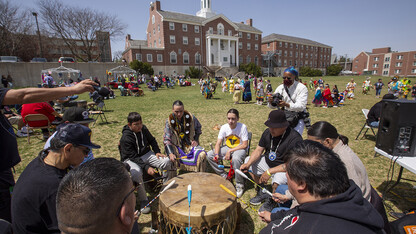· 3 min read
Study shows resources shape outcomes of Native kids of teen moms

An adage says that children follow in their parents’ footsteps. So are children destined to repeat their parents’ mistakes?
That depends, according to a new study by UNL researcher Rochelle Dalla that delves into how a generation of Navajo teens have fared while growing up as children of teenaged mothers.
Dalla, whose research focuses on marginalized female populations, first studied Navajo teen mothers in the 1990s. She circled back to this group of youths in 2007 and 2008 by interviewing the same mothers and their children, who were then teens.
For the study, published this month in the Journal of Adolescent Research, Dalla interviewed 14 youths from the Navajo reservation in Arizona. Dalla’s research found that, despite facing the same risks such as poverty and alcoholism and attending the same schools, the youths’ outcomes were diverse. They fell into three categories: well-adapted, overcoming and struggling. The majority was well-adapted, and only four of the teens could be described as struggling.
The study found that parental involvement and positive school experiences were a common thread among the thriving and well-adapted teens. More complex was the “overcoming” group of four youths, Dalla said, because they seemed to possess an ability to focus on and gravitate toward the positives around them.
“The teens in the middle really had some pretty negative things in their lives, some significant risks. But they were able to see beyond their current environments and were able to project a desire for something better,” said, an associate professor in UNL’s Department of Child, Youth and Family Studies. “They possessed an internal motivation to figure out what it would take to change their situation and had expectations of themselves to reach their goals.”
Among the four who were struggling, she said, three were already teen mothers and said they received little support at home, at school or among their peers.
“They were not doing well in any area of their life,” Dalla said. “There were very few bright spots and they didn’t really have anyone they could depend on. It’s almost as if they had given up.”
Dalla said the interviews with the teens reminded her of the importance of community resources, both tangible and abstract.
“If more resources were put into schools and education, what other kinds of talents would be cultivated there?,” she asked. “Also, there’s a very real importance of having even a single person in someone’s life who can provide a springboard for inspiration and open someone’s mind to realizing their potential.”
Ghough this study focused on Native youth, Dalla said the findings of the study are relevant to any impoverished community. It is also a reminder that there is significant diversity within cultural groups.
“Recognizing diversity within groups facing adversity is really important,” Dalla said. “You can’t just assume that these kids with all these risk factors are doing nothing or going nowhere, because you see this huge range of diversity in the outcomes.
“If they had more resources, just imagine what the potential outcomes would be.”








